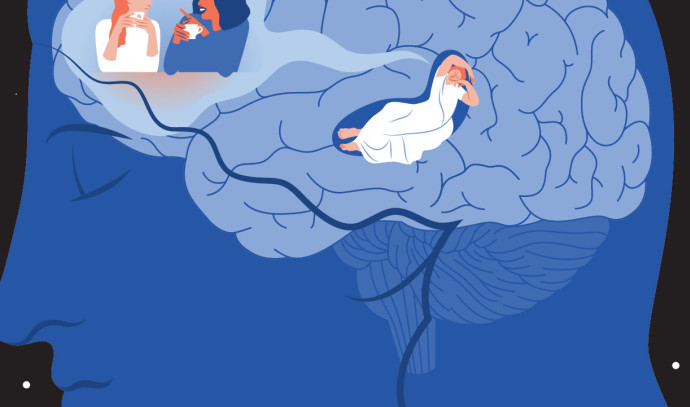Researchers from Tel Aviv University (TAU) and the University of California at Los Angeles (UCLA) have developed a method of deep-brain stimulation (DBS) during sleep that enhances memories, by making them less susceptible to interference and disruption as time passes.
Calling it a “breakthrough,” the team study showed for the first time that long-lasting memories are consolidated in the human brain through communication between the hippocampus and the cerebral cortex during sleep. The unique study has just been published in the leading journal Nature Neuroscience under the title “Augmenting hippocampal–prefrontal neuronal synchrony during sleep enhances memory consolidation in humans.”
It was carried out by an international collaboration led by Dr. Maya Geva-Sagiv (today at the University of California at Davis) with the laboratories of Prof. Yuval Nir from TAU’s Sackler Faculty of Medicine’s biomedical engineering department and the Sagol School of Neuroscience, together with Prof. Itzhak Fried from UCLA’s neurosurgery department and the Sackler Faculty.
The discovery began with a study of epilepsy at UCLA, said Nir. “Prof. Fried implanted electrodes in these patients’ brains to try and pinpoint the areas that cause their epileptic seizures, and they volunteered to take part in a study investigating the effects of DBS during sleep. Close work with expert neurologists led by Prof. Dawn Eliashiv at UCLA enabled our team to integrate advanced brain stimulation in the research.”
As a result, they were able to test for the first time in humans the long-held hypothesis that coordinated activity of the hippocampus and cerebral cortex during sleep is a critical mechanism in consolidating memories.
“Moreover,” Nir continued, “we improved memory consolidation through a special stimulation protocol that enhanced synchronization between these two areas in the brain. Intervention during sleep represents a unique approach that can be further developed in the future to provide hope for people with memory impairments such as dementia.”
Researchers monitored activity in hippocampus during sleep
Geva-Sagiv explained that “We know that a good night’s sleep is critical for the consolidation of long-lasting memories, but so far we had little evidence regarding the precise processes that are at work during human sleep.“In this study, we directly examined the role of neural activity and electrical brain waves during sleep. Our goal was to enhance the natural mechanisms at play, to discover exactly how sleep assists in stabilizing memories.”
The researchers developed a DBS system that improves electrical communication between the hippocampus – a deep-brain region involved in acquiring new memories, and the frontal cortex – where memories are stored for the long term. By monitoring activity in the hippocampus during sleep, the system enables precisely timed delivery of electrical stimulation to the frontal cortex.
The study’s participants completed two memory tests, comparing their performance after two different nights – one undisturbed and one with DBS. On both occasions, they were asked in the morning to recognize famous persons whose pictures they had been shown the previous evening. The study found that deep-brain stimulation significantly improved the accuracy of their memory.
“We found that our method had a beneficial effect on both brain activity during sleep and memory performance,” Fried said. “All patients who had received synchronized stimuli to the frontal cortex demonstrated better memory performance compared to nights of undisturbed sleep. The control group, who received similar yet unsynchronized stimuli, showed no memory improvement.
“Our DBS method is unique, because it is close-looped – stimuli are precisely synchronized with hippocampal activity. In addition, we monitored the stimuli’s impact on brain activity at a resolution of individual neurons.“Our findings support the hypothesis that precise coordination between sleep waves promotes communication between the hippocampus that takes in new memories, and the frontal cortex that stores them for the long term,” Nir concluded.
“To our surprise, we also discovered that the intervention did not significantly increase the number of right answers given by participants, but rather reduced the number of wrong answers. This suggests that sleep sharpens the accuracy of our memory, or in other words, it removes various distractions from the relevant memory trace.”



